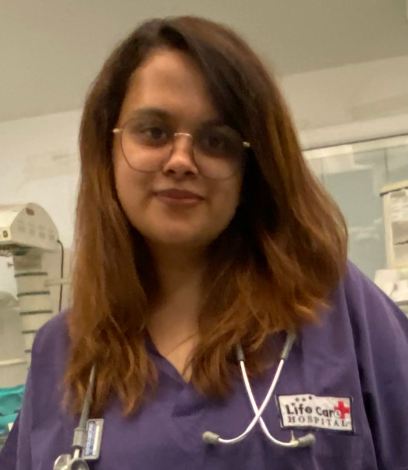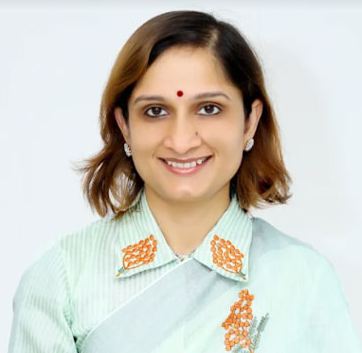Best Gynaecologist Obstetricians in Indore
Gynaecologist obstetricians :
Gynaecologist obstetricians or OB GYNs work to improve the health of the reproductive system in women. They provide a wide range of services that includes preventative care as well as issues arising during teenage years through menopause. Gynaecologist Obstetricians perform examinations and screenings like pap smears and breast examinations. They prescribe various contraceptive options for women. One can consult a gynaecologist obstetrician for their menstrual problems like pain during periods or heavy uncontrolled bleeding. They also deal with pelvic pain associated with ovarian cysts , PID, Pelvic problems . Gynaecologist obstetricians mainly focus on reproductive health with fertility counselings. Gynaecologist obstetricians perform hysterectomies for conditions like uterine fibroids and endometriosis. They provide hormone therapy for conditions like Polycystic Ovarian Syndrome that causes irregular periods, growth of facial hair in women and insulin resistance.
129 Gynaecologist Obstetricians found
Part 5 & 6, Race Course Road
R S bhandari Marg
Old Palasia, Indore
Get directions

OP Timings
Mon - Sat | 09:00 am - 04:30 pm |
Fee : 800
E 4-3, Scheme No 54
Opposite Hotel Marriot
Vijay Nagar, Indore
Get directions
Fee : 500
Dr. Kanakpriya Tiwari
MBBS, MD (Obstetrics and Gynaecology)
Fellowship in Advanced Laproscopy
Gynaecologist
View Profile
Life Care Hospital
Vijay Nagar
Plot No. 2
Scheme No.78-II
Vijay Nagar, Indore
Get directions

OP Timings
Mon - Sat | 10:00 am - 01:00 pm, 05:30 pm - 07:30 pm |
Fee : 500
107, Oasis Trade Centre
Above TVS Milan Auto
Yeshwant Niwas Road, Indore
Get directions

OP Timings
Mon - Sat | 01:00 pm - 03:00 pm |
Fee : 600
near L.I.G Square
Rss Nagar
AB Road, Indore
Get directions

OP Timings
Mon - Sat | 09:00 am - 12:30 pm |
Fee : 600
Bicholi Mardana Main Road
Opposite Agrawal Public School
Bicholi Mardana, Indore
Get directions

OP Timings
Mon - Sat | 10:00 am - 01:00 pm |
Fee : 900
9/2, Street No 5
Manorama Ganj
Indore Manorama Ganj, Indore
Get directions

OP Timings
Wed,Fri | 04:00 pm - 05:00 pm |
Fee : 900
7, Shakti Nagar
Ring Road
Vijay Nagar, Indore
Get directions

OP Timings
Mon - Sat | 05:00 pm - 07:00 pm |
Fee : 500
442-443, Eastern Ring Road
Near Bengali Square,Goyal Nagar
Bengali Square, Indore
Get directions

OP Timings
Mon - Sat | 11:00 am - 02:30 pm |
Fee : 500
C3 Multispeciality Hospitals
Vijay Nagar
Plot No 46-47, PU 4, Scheme No 54
AB Road, Behind C21 Mall
Vijay Nagar, Indore
Get directions

OP Timings
Mon - Sat | 11:00 am - 01:00 pm |
Fee : 800
Scheme No. 94, Sector 1
Near Teen Imli Square
Ring Road, Indore
Get directions

OP Timings
Fee : 700
22 C, Napania Road
Sanchar Nagar Extension
Indore Kanadia Road, Indore
Get directions

OP Timings
Mon - Sat | 10:00 am - 01:00 pm |
Fee : 500
202, Satya Sai Square
Sanrachna Avenue
AB Road, Indore
Get directions

OP Timings
Mon - Sat | 01:00 pm - 03:00 pm, 05:30 pm - 07:00 pm |
Fee : 500
12 D, Ocean Park
Near DPS
Nipania, Indore
Get directions

OP Timings
Mon - Sat | 10:30 am - 12:30 pm |
Fee : 500
Vishesh Jupiter Hospital
Ring Road
Scheme No. 94, Sector 1
Near Teen Imli Square
Ring Road, Indore
Get directions

OP Timings
Mon,Wed | 11:00 am - 12:00 noon |
Fee : 1100
Eureka Hospital & Research Centre
Old Palasia
347, Saket Nagar
Near Patrkar Colony Square
Old Palasia, Indore
Get directions

OP Timings
Mon - Sat | 11:00 am - 02:00 pm |
Fee : 500
Dr. Moon Jain
MBBS, MS (Obstetrics and Gynaecology)
Fellowship in Gynaec Laparoscopic Surgery
Fellowship in Infertility
Gynaecologist
View Profile
Pramila Hospital and IVF Center
Gumasta Nagar
10, Scheme 71
Ranjeet Hanuman Main Rd
Gumasta Nagar, Indore
Get directions

OP Timings
Mon - Sat | 01:00 pm - 07:00 pm |
Fee : 400
Narendra Tiwari Marg
Usha Nagar
Sudama Nagar, Indore
Get directions

OP Timings
Mon - Sat | 12:00 noon - 05:00 pm |
Fee : 500
2nd floor, Choitram clinic
48 annnapurna road
Sudama Nagar, Indore
Get directions

OP Timings
Mon - Sat | 10:00 am - 11:30 am |
Fee : 500
Arogyam Hospital
Navlakha
118, Prakash Nagar
Navlakha Chauraha
Navlakha, Indore
Get directions

OP Timings
Mon - Sat | 11:00 am - 02:00 pm, 06:00 pm - 07:00 pm |
Fee : 400
The Recovery Hospital
New Palasia
2/3, Janjeer Wala Chouraha
Near Apna Avenue Hotel
New Palasia, Indore
Get directions

OP Timings
Mon - Sat | 12:00 noon - 03:00 pm |
Fee : 700
Dr. Asha Sethia
MBBS, DGO
Diploma in Gynecological Endoscopy
Diploma in IUI and Ovulation Inducation
Gynaecologist
View Profile
Aditya Hospital
Usha Nagar
318, Ranjeet Hanuman Road
Annapurana Road, Usha Nagar Ext
Usha Nagar, Indore
Get directions

OP Timings
Mon - Sat | 11:00 am - 02:00 pm, 06:00 pm - 08:00 pm |
Fee : 300
How do you prepare for a Gynecologist consultation?
Preparing for a gynaecologist consultation helps ensure a smooth and effective appointment. Here are steps to help you get ready:
- Choose a date for your consultation when you're not on your menstrual period, as it can affect certain tests and exams
- Make a list of your medical history, including any medications you're taking, previous surgeries, and family health issues related to women's health
- Write down any symptoms or concerns you have, like irregular periods, pain, or changes in your breasts
- Prepare a list of questions or topics you want to discuss with the gynaecologist, such as birth control options, fertility concerns, or menopause symptoms
- Wear comfortable clothing as you may need to change into a gown for certain examinations
- If you've had previous gynaecological tests or treatments, bring relevant records or results with you
It's natural to feel nervous, but try to relax. Remember, the gynaecologist is there to help and answer your questions.
What are the common conditions seen by Gynecologists?
According to the top gynaecologist in Indore, some commonly seen women's health issues include:
- Menstrual Disorders: Irregular periods, heavy bleeding, or severe cramps
- Polycystic Ovary Syndrome (PCOS): Hormonal imbalance affecting the ovaries
- Urinary Tract Infections (UTIs): Bacterial infections affecting the urinary system
- Breast Health: Concerns like breast cancer or benign conditions
- Reproductive Health: Issues related to fertility, pregnancy, and menopause
These health issues can cause discomfort and pain, disrupting daily activities and affecting emotional well-being. If left untreated, some conditions can also lead to complications. Thus, seeking immediate consultation with the best gynaecologists near you for timely treatment is crucial.
What kind of treatments do Gynecologists provide?
The best gynaecologist in Indore provides a wide range of medical services focused on women's reproductive health.
- They conduct routine screenings, such as Pap smears and pelvic exams, to detect and prevent conditions like cervical cancer.
- They offer family planning guidance, prescribing contraceptives and discussing fertility concerns.
- They diagnose and treat various gynaecological issues, including infections, menstrual disorders, and hormonal imbalances.
- These specialists also oversee prenatal care during pregnancy, ensuring the health of both the mother and baby.
- They may perform surgical interventions, such as hysterectomies or ovarian cyst removals when necessary.
- Gynaecologists also address menopausal symptoms, providing hormone replacement therapy and managing related health concerns.
Frequently asked questions
How does one become a Gynecologist?

To become a gynaecologist, one must complete a Bachelor of Medicine, Bachelor of Surgery (MBBS) degree, typically a five-and-a-half-year program. Following this, aspiring gynaecologists undertake a postgraduate degree in Obstetrics and Gynecology (MS or MD), which takes three years to complete. Practical training is gained through internships and residency programs.
After completing these steps, individuals may register with medical councils and obtain the necessary certifications to practice as qualified gynaecologists.
What would be the consultation fees of a Gynecologist in Indore?

The consultation fees may vary based on the doctor's experience, clinic location, and the nature of the consultation. On average, initial consultations may range from INR 500 to INR 1,000 or more. Follow-up visits or specialized consultations may have different fee structures. It is advisable to check with the specific clinic or hospital for accurate and up-to-date information on consultation fees.
What are the symptoms of gynaecological diseases?

Symptoms of gynaecological diseases vary but may include pelvic pain, abnormal bleeding, unusual vaginal discharge, discomfort during intercourse, and changes in menstrual patterns.
- Conditions like endometriosis may cause severe menstrual cramps
- Infections can lead to itching or burning sensations
- Polycystic Ovary Syndrome (PCOS) may cause irregular periods and hormonal imbalances
If you experience any persistent or unusual symptoms, consult with the best gynaecologist in Indore for accurate diagnosis and appropriate management. Also, make sure to have regular gynaecological check-ups to maintain reproductive health and address potential issues early on.
How often should women consult a gynaecologist?

Women should generally schedule annual visits with a gynaecologist for preventive care, screenings, and reproductive health assessments. During pregnancy, obstetrician visits are more frequent, typically monthly in the early stages, becoming more frequent as the due date approaches. However, the frequency may vary based on individual health needs and pregnancy progress. Regular check-ups with these specialists are essential for maintaining overall reproductive health and ensuring a healthy pregnancy.
Do gynaecologists and obstetricians treat PCOS/PCOD?

Yes, gynaecologists and obstetricians commonly treat Polycystic Ovary Syndrome (PCOS/PCOD). PCOS is a hormonal disorder affecting the ovaries, often leading to irregular periods, cysts on the ovaries, and fertility issues. Gynecologists conduct thorough evaluations, including hormonal assessments and ultrasound examinations, to diagnose PCOS. They develop comprehensive treatment plans that may involve lifestyle modifications, medications to regulate hormones, and fertility treatments if needed.
Do gynaecologists perform fertility tests?

Yes, gynaecologists routinely perform fertility tests as part of their comprehensive reproductive health services. These tests aim to identify factors affecting fertility and assist in developing personalized treatment plans.
Common fertility tests conducted by gynaecologists include assessing hormone levels, tracking ovulation, evaluating uterine and ovarian health through ultrasound, and conducting semen analysis for male partners.
Gynaecologists may also recommend more specialized tests like hysterosalpingography (HSG) to assess the fallopian tubes. The results of these tests help gynaecologists diagnose fertility issues and determine appropriate interventions, such as fertility medications, intrauterine insemination (IUI), or referral to a reproductive endocrinologist for advanced treatments like in vitro fertilization (IVF).
What is the Difference Between a Gynaecologist and Obstetrician Doctor?

Both gynaecologists and obstetricians specialize in women's reproductive health, but a gynaecologist primarily focuses on the overall health of the female reproductive system, addressing issues such as menstrual disorders and gynaecological conditions. On the other hand, an obstetrician specializes in pregnancy and childbirth, managing prenatal care, delivery, and postpartum care. Some practitioners, known as OB/GYNs, are trained in both fields, providing comprehensive care for women's reproductive health throughout all life stages.
Where can I find the best Gynecologist in Indore?

Skedoc helps you find the top gynaecologists near you. The platform provides a user-friendly interface to browse verified profiles, read patient reviews, and conveniently schedule appointments online. With easy access to comprehensive information and a diverse range of specialists, the platform ensures a streamlined process, making it efficient for users to connect with the best gynaecologists in Indore.




















